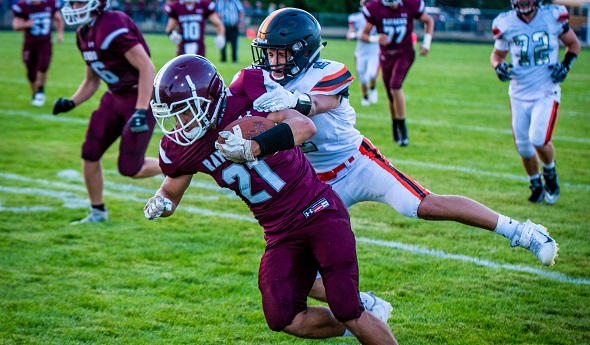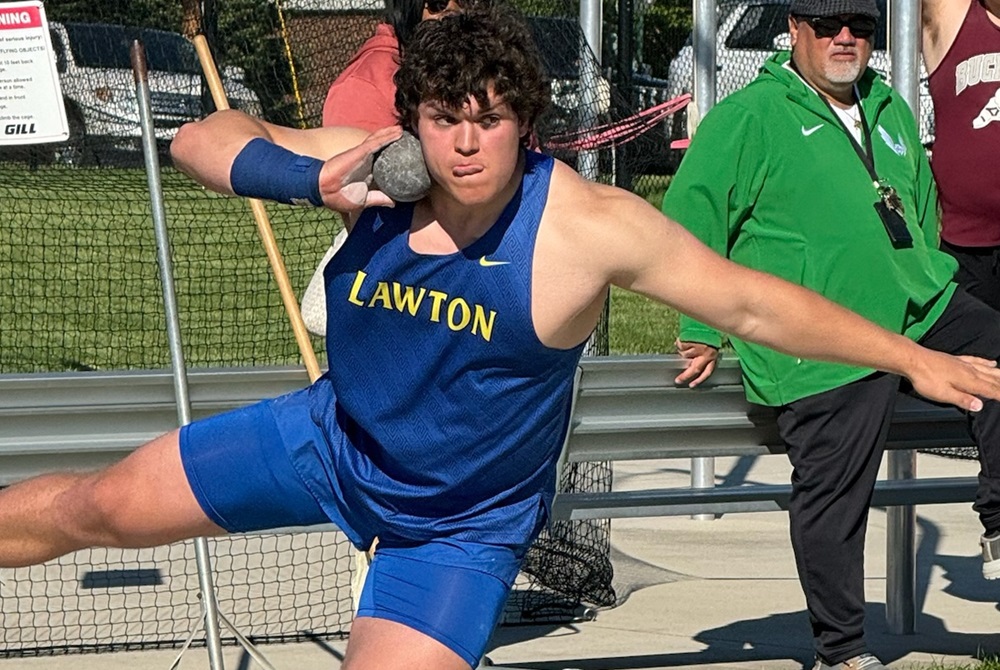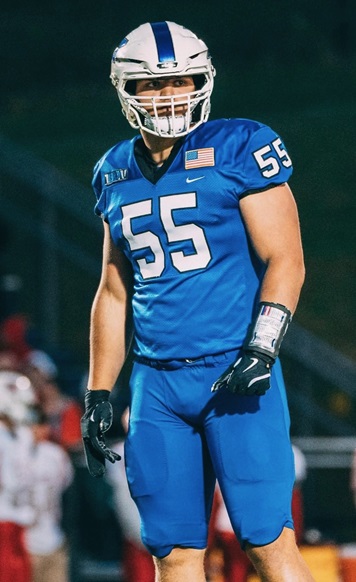
Northern Schools Find Solution in NMFL
September 6, 2019
By Chris Dobrowolski
Special for Second Half
With 17 schools spread across 11 counties, the Northern Michigan Football League has created an indelible footprint since it was born into existence five years ago.
 The conference, made up of three divisions of schools in varying size, has been able to sustain and evolve despite an ever-changing football landscape up north that has made for a revolving door of membership from year to year.
The conference, made up of three divisions of schools in varying size, has been able to sustain and evolve despite an ever-changing football landscape up north that has made for a revolving door of membership from year to year.
“It continues to morph,” said Frankfort athletic director Dave Jackson, the conference’s commissioner and one of the founders of the league.
From the biggest schools in the Legends division — Benzie Central, Boyne City, Cheboygan, Grayling, Kalkaska, Kingsley and Traverse City St. Francis — to the smaller schools in the Leaders (Charlevoix, Elk Rapids, Frankfort, Mancelona and Maple City Glen Lake) and Legacy divisions (Harbor Springs, East Jordan, Inland Lakes, Johannesburg-Lewiston and St. Ignace) the NMFL has provided easy avenues for scheduling as well as good, competitive balance for the programs that call it home.
“The scheduling aspect is where I go back to it,” said Johannesburg-Lewiston football coach and athletic director Joe Smokevitch. “It’s just been huge for us. Going into 2020 and 2021 my schedule is full, basically with teams from within the conference. They’re not all division games. I am crossing over and playing those other schools. It’s really helped with scheduling. Not having to go far away to play somebody. You look at our schedule. We play some quality opponents. I think the conference is very strong from top to bottom.”
The idea for the league was hatched in 2012 between schools in the Lake Michigan and Northwest conferences. Both leagues were seeing problems from smaller schools trying to compete with larger ones, and neither side benefitting from the affiliation. So, the two merged as a 13-team league comprised of two divisions of similar-sized enrollments.
The league has rarely stayed intact from year to year, switching to the three-division alignment with the growth to 20 teams in 2016 when it absorbed the remaining teams in the Ski Valley Conference, as well as withstanding the loss of six schools to 8-player football in the span of four years.
“We’ve taken schools in the league that didn’t last very long,” said Jackson. “We took in Newberry and they lasted just a year, then suddenly they’re 8-man. We took in Gaylord St. Mary. We took in Central Lake. Those teams were just a year or two and suddenly they’re gone. Our constitution calls for a two-year process of getting out, but those teams that had to go 8-man, they’re out for the next year. So, suddenly you’re scrambling again, which is the one thing we were trying to keep from having to do because there is no planning when that last-minute 8-man decision comes along and schools decide to make that plunge. There’s nothing you can really do when a school says they’re going to do that. You can’t say, ‘Well, the constitution says … .’ They’re going to do what they need to do.”
 Fortunately for the league, it has been able to find suitable replacements at every turn. In fact, Ogemaw Heights and Sault Ste. Marie are set to join in 2020 to become part of the Legends division, bolstering the league to a robust 19 schools. Kalkaska and Boyne City will slide over to the Leaders division and Frankfort — one of the smallest 11-player football teams in the state — is moving to the Legacy division.
Fortunately for the league, it has been able to find suitable replacements at every turn. In fact, Ogemaw Heights and Sault Ste. Marie are set to join in 2020 to become part of the Legends division, bolstering the league to a robust 19 schools. Kalkaska and Boyne City will slide over to the Leaders division and Frankfort — one of the smallest 11-player football teams in the state — is moving to the Legacy division.
“It made sense to apply,” said Ogemaw Heights athletic director Jon Studley, noting four future conference foes already are on this year’s schedule. “We’re very excited about the opportunity to be a part of that. We’re going to be able to create some rivalries.
“I think fans of northern Michigan football benefit the most. They’re seeing competitive football week in and week out.”
As the NMFL has shown, the quality of football being played within the conference is at a high level, too. At least one team from the league has reached the Semifinal round of the MHSAA playoffs every season. Boyne City was a semifinalist in Division 6 in 2014, while St. Francis has represented the league in the Semifinals in 2015, 2017 and 2018. In 2016 two teams advanced that far — St. Ignace in Division 8 and Maple City Glen Lake in Division 6 — with Glen Lake reaching the Finals before falling to Jackson Lumen Christi 26-14.
“I think we’re really starting to get some respect,” said Glen Lake coach Jerry Angers. “I’ve talked to the teams downstate that we’ve played, they want to come up and play us. They’re not saying, ‘This is going to be an easy game.’ They’re saying, ‘This is going to be a fun game, and they’re going to give us something.’”
There remains the possibility the league will undergo more changes before it more comfortably stabilizes. Some schools have expressed interest in joining, and the threat of losing members to 8-player football remains for a few of the smallest schools. It’s nothing the league hasn’t dealt with before, however. Jackson said it comes down to maintaining a commitment to the schools that are in the conference and carefully examining any growth that could occur.
“We had our big meeting in December, and one thing we talked about is how we have to look out for each other,” said Jackson. “We’re trying to guarantee that the league will provide eight of your nine games. In most cases the league is providing all nine of the games. So, you know you’re going to have somebody to play and you’re not going to have to go looking. There’s a time we may control 11-man football for everything north of Lansing. I don’t know. It continues to grow because teams are looking for that stability and consistency year in and year out, so they know who their games are with and they know who they play.”
 Chris Dobrowolski has covered northern Lower Peninsula sports since 1999 at the Ogemaw County Herald, Alpena News, Traverse City Record-Eagle and currently as sports editor at the Antrim Kalkaska Review since 2016. He can be reached at sports@antrimreview.net with story ideas for Manistee, Wexford, Missaukee, Roscommon, Ogemaw, Iosco, Alcona, Oscoda, Crawford, Kalkaska, Grand Traverse, Benzie, Leelanau, Antrim, Otsego, Montmorency, Alpena, Presque Isle, Cheboygan, Charlevoix and Emmet counties.
Chris Dobrowolski has covered northern Lower Peninsula sports since 1999 at the Ogemaw County Herald, Alpena News, Traverse City Record-Eagle and currently as sports editor at the Antrim Kalkaska Review since 2016. He can be reached at sports@antrimreview.net with story ideas for Manistee, Wexford, Missaukee, Roscommon, Ogemaw, Iosco, Alcona, Oscoda, Crawford, Kalkaska, Grand Traverse, Benzie, Leelanau, Antrim, Otsego, Montmorency, Alpena, Presque Isle, Cheboygan, Charlevoix and Emmet counties.
PHOTOS: (Top) Charlevoix, carrying the ball, opened this season with a 40-26 win over Elk Rapids. (Middle) East Jordan got a step on Harbor Springs on this play last week, but the Rams emerged with a slim 34-33 win. (Photos by Sports in Motion.)

Football Future Awaits, but Mayne Focused First on Finishing Track Finals Sweep
By
Pam Shebest
Special for MHSAA.com
April 22, 2025
LAWTON — One inch. One lousy inch.
 That was the difference between a championship and second place for Mason Mayne in the shot put at last year’s MHSAA Lower Peninsula Division 3 Track & Field Finals.
That was the difference between a championship and second place for Mason Mayne in the shot put at last year’s MHSAA Lower Peninsula Division 3 Track & Field Finals.
One year later, it is still fresh in the mind of the personable Lawton senior as he begins his quest for more hardware.
“That one hurt,” said Mayne, whose best attempt finished second to a 60-foot, 2-inch toss by Pewamo-Westphalia’s Gavin Nurenberg.
“That really burned. You start to wonder, did they measure it wrong? What if I just literally put a little more into it? It drove me to work harder toward it.”
That harder work paid off during the second event that day as Mayne defeated the then-senior Nurenberg 166-6 to 165-11 in the discus to claim Lawton’s first-ever track & field state championship in that event.
Besides taking home that Finals title last year, Mayne holds school records with an indoor-season shot of 62-6 and outdoor of 60-9, as well as a discus toss of 178 feet.
An all-state football player and outstanding student as well, Mayne had opportunities to continue his athletic careers in both sports before signing with Northwestern University. But he also made the decision to compete for his high school one more time this spring instead of graduating early to begin his college career – much to the delight of Lawton track & field coach Mike Meyer.
“He’s been nothing but a joy ever since his freshman year,” Meyer said. “He’s a good, hard worker, obviously a great athlete. All his talent is definitely a nice problem to have.
“He’s been a two-year captain for us, so a good leader, (he) does everything and more than what we ask. That’s why he has the success that he has.”
All-around talent
Mayne said coaching is one big crossover from football to track & field.
“Listening to someone tell you what to do and then do it, I think that’s a super big part of throwing,” he said. “If someone tells you how to do something better in your throw to make it technically better, and you can’t do it, then you can’t get better.
“Playing football for so long, I’ve had so many coaches tell me to do this just a little bit different. And being able to flip that and make that change and adjustment, that’s what makes me able to get better at throwing.”
Mayne said hurling the disc takes more finesse than the shot.
“Technical-wise, the shot put (12 pounds) is easier because I can base it more on how much muscle I can put into it,” he said. “Discus is lighter, (3.5 pounds) but you also have to use your technique a lot more.
“Also, you have to push your body to a point of really stretching it back, allowing it to create a lot of torque into the disc to be able to throw it far enough for it to be worth anything.”
As for those windy days competing in field events, “A lot of people think that the wind behind you helps you,” Mayne said. “That’s actually not true.
“It actually bats the disc down. In the discus, as a right-handed thrower, you want the wind to come across a little bit from your left to throw into. Think of it as an airplane wing, holding up the airplane, the air coming into it. With the shot, it doesn’t matter. It’s just throwing it.”
Lawton’s athletes who specialize in field events also compete in some running competition. Mayne has run the 200 this season and took a turn running the 100 last spring as well.
 “We usually have our throwers run the 200,” Meyer said. “We like athletes instead of just specializing in just one or two things for the (Southwest Athletic) Conference.
“We usually have our throwers run the 200,” Meyer said. “We like athletes instead of just specializing in just one or two things for the (Southwest Athletic) Conference.
“We have all of our kids run two, three and sometimes four events. It can be a long day at a track meet if your events are done and you have nothing to do.”
Mayne is not only an accomplished athlete, but carries a 4.19 grade-point average.
“With the way my mom (Pat) raised me and my brother (Carter) both, she’s a teacher at Paw Paw in the elementary,” he said. “She raised us with the idea that academics are very important. That’s where I’m academically driven.
“She might get mad at me for saying this, but if I miss an assignment, I’m getting a picture on my phone with a circle around it of the assignment missing in my grade book. It’s very important to me.”
That emphasis motivates Mayne’s advice for freshmen who play sports.
“Stay on top of (academics),” he said. “For so many years my mom kept me on top of things. Now I’m able to stay on top of things better myself.
“Your freshman year is the make-or-break it. Having an older brother helped a lot because without him, he wouldn’t have told me that and I wouldn’t have stayed ahead of it.”
Tough decisions
Mayne’s outstanding performances in throwing events last year attracted several college scholarship offers for track in addition to several he’d received previously for football. Choosing a college was not an easy decision for the defensive lineman, who is a two-time Kalamazoo Gazette Dream Team selection in that sport.
“It’s funny because I was really, really considering track for a while,” said the 6-foot-3, 275-pound Mayne. “After my sophomore year when I had a very successful track season, I started to lean toward track.”
 But a trip to the Big House to watch University of Michigan play tilted the scale to football.
But a trip to the Big House to watch University of Michigan play tilted the scale to football.
“I was watching and I realized I just couldn’t give it up,” he said. “I love both sports, but something about football, the team atmosphere, just sitting in the stadium gets me antsy, that atmosphere and that vibe. That’s really what flipped me into the football aspect. That electricity from the fans and the guys around you. I haven’t experienced any other sport like it.
“It was a very tough decision. I was sad that I couldn’t go multiple ways. Many fantastic coaches recruited me. It’s unfortunate that you have to tell coaches you can’t go to their program because you’re choosing a different program.”
Mayne said he had specific criteria in mind when choosing a college. “Academics is a priority here,” he said. “I also want to play football at a very high level, and then the last is a family aspect.
“Northwestern just checked all the boxes.”
Before the season, Meyer thought he might lose Mayne to early graduation since “he’s a very, very good student. We chatted and he said, ‘Coach, I definitely want to be throwing. I love throwing,’ and he’s a man of his word.
“Once he told me that, I was more excited for the season.”
At one point, Mayne did indeed consider leaving high school to enroll early at Northwestern, which would have meant missing his final spring throwing season.
However, “my mom wasn’t ready for me to leave, which I’m fine with,” he said. “I understand that. I’m her youngest child, I get it.
“Also, you get to start throwing indoors and it’s like, ‘I don’t want to give this up, either.’”
 Pam Shebest served as a sportswriter at the Kalamazoo Gazette from 1985-2009 after 11 years part-time with the Gazette while teaching French and English at White Pigeon High School. She can be reached at pamkzoo@aol.com with story ideas for Calhoun, Kalamazoo and Van Buren counties.
Pam Shebest served as a sportswriter at the Kalamazoo Gazette from 1985-2009 after 11 years part-time with the Gazette while teaching French and English at White Pigeon High School. She can be reached at pamkzoo@aol.com with story ideas for Calhoun, Kalamazoo and Van Buren counties.
PHOTOS (Top) Lawton’s Mason Mayne begins to unwind while throwing the shot during a meet. (Middle) Lawton track & field coach Mike Meyer. (Below) Mayne stands tall on the football field. (Action photos courtesy of Mason Mayne; headshot by Pam Shebest.)

